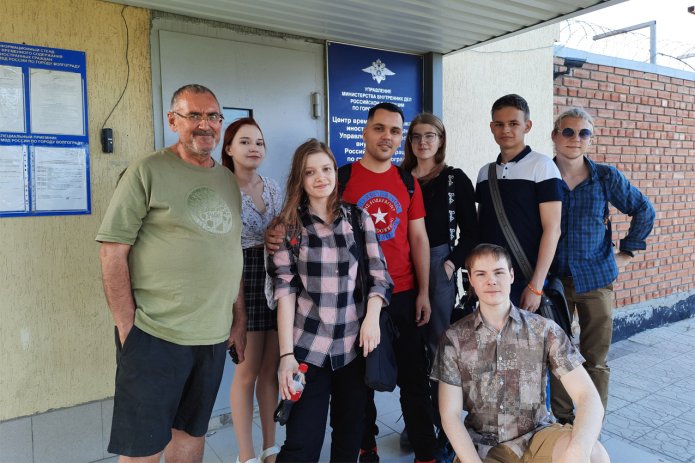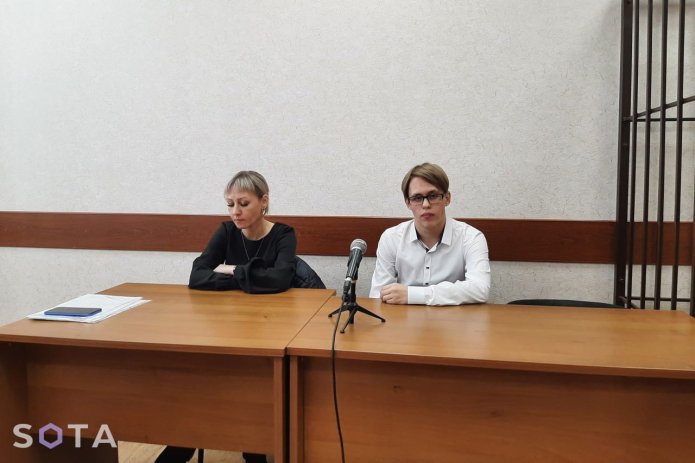Dozor (The Watch) is a regional project from Volgograd, a major city north of Sochi. The project channel has over 26 thousand subscribers on Youtube and over five thousand in Telegram currently. Two criminal cases have been brought against the founder of Dozor, Yevgeny Kochegin: оne for evading alternative civilian service (part 2 of Article 328.2 of the Russian Criminal Code) and the other for publishing «fake facts» about the Russian army (point «d» of part 2 of Article 207.3 of the Russian Criminal Code). He was put on a federal and international wanted list and has been arrested in absentia by the Central District Court of Volgograd. Here is the story of the project, which has been targeted since its creation.
«To bring together people with diverse perspectives»
«If you are reading this text, it means you are the resistance» — these are the first words of the banner that appeared on the main page of Dozor project when on November 22, Roskomnadzor (Federal Service for Supervision of Communication, Information Technology and Mass Media) blocked its website in Russia.
The project’s participants have long been facing searches, administrative cases and complaints; the project’s creator Yevgeny Kochegin has been labeled a «foreign agent» and now the website can only be accessed via a VPN. The Dozor team links the blocking to a counter that counts Russian soldiers — residents of Volgograd and the region — who have died in Ukraine. Shortly before the blocking, it exceeded a thousand names.
Dozor was founded in 2021 by former members of Aleksey Navalny’s Headquarters in the region, which ceased operations following a ruling issued by the Moscow City Court on June 9, 2021. On that day the court recognized the Anti-Corruption Foundation (FBK) and Navalny’s Headquarters as extremist organizations. From that moment on, participants and coordinators have been under threat of criminal liability under Article 282.2 (Organizing operations of an extremist organization) of the Russian Criminal Code.
«I had worked at the Headquarters until the very end — I had been the coordinator of the Volgograd Headquarters», Yevgeny says. «When the Headquarters closed, we decided to continue doing something of our own in the region and became the only ones representing an oppositional view to the official government line».
The project is managed by a small group of core members: according to Yevgeny, you can count them on the fingers of one hand. Occasionally, IT specialists and designers help as volunteers.
At first, the project was conceived as a movement of observers during the State Duma elections.
«We brought people with the most diverse views», Yevgeny recalls. «We had both Stalinists and Yabloko members (Yabloko — one of the most high-profile opposition parties in Russia) — all groups were there. The idea — to make elections more transparent, report all violations, and expose them to the public — united everyone. Back then, we were even on local TV news. There is a puppet pro-government social activist who had the task of discrediting the work of our observers, exposing it as a provocation, and he carried this task out responsibly».
«A fork in the road arises: either you stay imprisoned in your homeland or you leave
After the elections were over, the team turned to investigations and became an oppositional information and analytical project. The team already had investigative experience from the Headquarters.

«We learned how to check facts and knew where to look for interesting things», says Marya Khudoyarova, another Dozor employee who also worked at the Navalny Headquarters until 2021. — «Before joining the Headquarters, I myself was a government official and worked in a government agency, in the procurement department, so I have proper experience and knowledge».
Marya recalls the investigation their team conducted after a question and answer broadcast with Volgograd Region Governor Andrei Bocharov. According to her, the team checked on every person who asked questions and found out that all of them were members of United Russia (a pro-Putin political party), local party activists, or current government officials.
«Last year we canceled a purchase of a crossover (SUV-style car) for the head doctor of a hospital in Volzhsky (a city in the Volgograd region — OVD-Info), a supporter of United Russia», says Marya about the project’s investigation. — «He longed for a new car, but it didn’t work out. At that time, Yevgeny was sent to that very hospital for alternative civilian service that he had applied for. I think it was to serve as a medical orderly. But by that time we had already left the country, and the head doctor later said that we had decided to take revenge on him. We didn’t intend to do anything like that; we just saw this purchase and thought: how can you afford a crossover when you don’t have an MRI machine and proper conditions for treating patients?»
In a conversation with a journalist of the Volgograd media outlet V1, head doctor of Hospital No.3 Dmitry Shipunov did not explain what exactly, in his opinion, the activists were taking revenge for: «The complaint was filed by Yevgeny Kochegin, a fairly well-known person. It so happened that he did not want to join the army, and so he chose alternative civilian service and had to undergo it in our hospital. He didn’t come to us but went on the run. As far as I know, he is now somewhere abroad and is probably trying to take revenge on us in this way».
Almost immediately RIA FAN («Federal News Agency»), a publication associated with Yevgeny Prigozhin, complained to the prosecutor’s office about the new project and demanded it be checked for extremism.
«They wrote a statement on me and Marya Khudoyarova», Kochegin explains, «Its essence was that Dozor was a cover for Navalny’s new headquarters. That statement has so far led nowhere. At the time, I was still in Russia myself, and I was under investigation for evading alternative civilian service».
Before the 2021 State Duma elections, Yevgeny and Marya left the country. At first, they thought it was temporary.
«In 2021, I left to coordinate the elections and conduct observation,» says Yevgeny, «It was clear that they would come to my house with a search — I’ve had them many times before. Once, we coordinated a rally on behalf of Navalny’s headquarters when he was not receiving medical care in the penal colony. Not knowing how to smoke us out, the law enforcers came to our house with pliers and simply cut the internet in our part of the building like some criminals».
Just a month after the elections, a criminal case was initiated against Yevgeny for evasion of alternative civilian service. He and Maria Khudoyarova chose not to return to Russia.
«I have spent my entire life in Volgograd and never even considered leaving. I wanted to progress in my own city, help it to improve. But at some point, I faced a choice: stay in my native country, but possibly in prison, or leave, but be able to do something remotely. For me the decision was obvious: I didn’t want to be in prison, useless», Khudoyarova adds.
Volunteers of the project remain in the country. Nikolai (name changed for safety reasons) is 22 and he keeps helping Dozor from within Russia by making videos.
«I work behind the scenes. I think it’s 90% safe. For now, I don’t see serious risks for myself», he says. «I can be tracked down only if my files are exposed. I’ll be honest: when the full mobilization was announced, I panicked and looked at ways to leave. But for now I’m here. I want to see what comes next, after all. Where would I go? My home is here, I’m going to fight for it».
«My dear son has died, we wish to commemorate his memory»
Since the beginning of Russia’s all-out war against Ukraine, Dozor has become the main anti-war initiative in the region. Since late February of 2022, its members have organized two anti-war rallies. According to the movement’s creators, holding a rally soon became impossible due to arrests. The team started to distribute leaflets. Then that also became dangerous: people got found by surveillance cameras and mobile phone billings.
The telegram post reads: ❤️ Photo from the rally. Bright and brave Volgograd residents protest with their faces open, against whom they brought out an army of darkness in balaclavas and helmets.
Legitimate authorities do not behave this way!
@yourdozor
«We could no longer draw anyone into it», Yevgeny says. «It’s a great responsibility: we would only lose the core members of the team and they would be in detention. The times have toughened, the order has toughened. There were less active members, but more supporters and online followers: we had our first channel explosion at the beginning of the war, then also after the mobilization announcement».
«We had to reposition our channels to fit the anti-war agenda», Marya adds. «When fines turned into criminal charges in the blink of an eye, leaflet posters got really scared, and many left the country. Working became harder, since we aren’t at Volgograd and don’t have anyone who could supply information from the inside. But we still can write complaints, write petitions to various authorities, check procurements and what money is spent on, and send petitions to Federal Antimonopoly Service Directorates. Right now we deal with everything related to the war, mobilization, procurements, and corruption».
On May 9, 2023 the team kicked off The List of the Fallen project. According to the project’s members, it serves as a counter to «the patriotic frenzy that happens in Volgograd every Day of War Glory».
«Our activists were visiting cemeteries in Volgograd city and the Volgograd region, sending numerous photos of graves. We checked all these names, searched for people on social networks and cross-verified the information to confirm their demise. The list gained scale and volume, and relatives and colleagues of the victims reached out to us, literally sending death certificates. The narrative was often along the lines of, „My son has passed away, and we wish to commemorate his memory somewhere“. Unfortunately, Volgograd media often show little interest in these cases. Furthermore, based on information from local journalists, they are restricted from reporting on more than a certain number of deaths within a specific period of time. We are the sole organization in the region dedicated to this cause», says Evgeniy.
A YouTube video where Dozor counts the war Volgograd Ukraine war KIAs, released on May 9, Russia’s V-day.
The list expanded. On the day when it reached a thousand people, the project’s webpage was blocked. According to Yevgeny, the blockage has now been circumvented.
«We’re not presenting this as a list of criminals or orcs; that’s the point. This is a list of war victims», states Yevgeny. «Even if they are contract soldiers or private military company contractors, their deaths are a great loss for their loved ones. Recently, we made an exception: a woman wrote that her son had passed away, providing information that he was a PMC contractor. Then, perhaps out of shame, she changed her mind about disclosing his affiliation with a PMC. We removed this detail, although, of course, it remained in the databases. But since the relative herself provided this information and requested its removal, we complied».
Yevgeny mentions that some accuse them of engaging in «illegal activities» by collecting data. However, he asserts that all their sources are open to the public, be it city or village cemeteries or social networks.
«This is a significant and meticulous job that demands a considerable amount of time and patience», adds Marya. «There is a vast amount of information that needs to be analyzed and processed».
What else does the team do?
According to Marya, the average resident of Volgograd currently lacks attention for politics. Therefore, it is essential to address their interests in the project’s topics, making them interesting and relatable.
«It is crucial that we address the problems of a specific region and target it», explains Nikolay. «If someone seeks an alternative point of view, they will know that it is available in Volgograd. They can reach out to us, seeking help or publicity. For instance, we recently covered the story of Pavel Abramov, who has applied to switch from military to civilian service but got refused. The main issues in Volgograd involve attempts to revert its name back to Stalingrad. Initially this change was proposed by local authorities, but they later realized that people do not want it, and reversed their decision. Additionally, there is a concerning presence of neo-Nazis in the city. While I knew of their existence, I didn’t expect them to be so publicly visible. They marched through Central Park, saluting with their right hands and shouting „Glory to Russia!“. It was a genuine culture shock for me, and I am embarrassed to live among people who despise someone because of their skin color or race. Beyond these specific challenges, the region faces the same issues as other areas: wasteful spending and corruption».
The Dozor team actively engages in educating on mobilization issues with a dedicated playlist available on their YouTube channel. They also undertake specific tasks, such as providing assistance to Yaroslav Inozemtsev, a Volgograd schoolboy who faced prosecution for allegedly planning an attack on a school. In a video documenting his departure from Russia, Inozemtsev claimed that the case against him was fabricated, stating, «I was an ordinary teenager with typical hobbies. They decided to label me as a terrorist because of my anti-government and anti-Putin posts on social networks».
In July 2022, Inozemtsev was found guilty of attempting to commit a terrorist act (Part 1 of Article 205 of the Criminal Code using Part 3 of Article 30 of the Criminal Code), illegal storage of explosives (Article 222.1 of the Criminal Code), and manufacturing explosive devices (Article 223.1 of the Criminal Code). As a result, he was prescribed compulsory psychiatric treatment. In January 2023, this decision was upheld by the appellate court. Simultaneously, Yaroslav and his mother chose to leave the country (a move facilitated by Dozor volunteers).

«Of course, we have not only successes, but also financial problems, which are well known for all small regional projects», says Yevgeny Kochegin. «Our employees work two or three jobs and do something else to stay afloat. We are raising funds in Russia and calling for donations, but we also understand the main difficulties and challenges: the population is getting poorer, Volgograd is recognized as the poorest million-city in Russia, residents are increasingly intimidated to support such initiatives, and there are fewer and fewer technical ways to make collections. Due to sanctions, you can no longer use secure services to collect money. To assess such measures of the European Union, [Yevgeny] Roizman’s comments are suitable: these are absolutely stupid measures. Of course, we continue to look for grants and stipends».
According to Yevgeny, activism in Russia is now only possible in its shadowy side: for example, helping projects obtain information, sending materials. He sees no point in public actions:
«A person won’t stand at the picket for long, but he’ll expose himself, and will be watched after. If this is a man, it means that he will be oppressed and drafted into the army. Lots of risks, little use. I see the benefit in public speeches by those who formally take a neutral position, and not by „extremists“ like us. For example, the wives of mobilized men, who cannot be interpreted by the state as enemies and traitors».
On September 15, 2023, the Ministry of Justice recognized Yevgeny as a foreign agent: the department’s website only says that he «disseminated false information» and «carried out activities aimed at creating a negative image of the Russian Federation» and at the same time «lives outside the country». There is no information about foreign funding.
«I was waiting for this», says Yevgeny. — «A year ago, I was told that the Volgograd FSB (Federal Security Service) was preparing a note for the Ministry of Justice, but an honest FSB officer couldn’t find anything. Apparently, there was an order to recognize all former Navalny Headquarters coordinators as foreign agents, so that all publications would contain this awful warning for the „deep nation“. We are often reproached that we receive „US State Department cookies“; a new Kremlin narrative has emerged — „CIPsO“ (Information and Psychology Operations Center of Ukraine). If that was the case, we wouldn’t have to work three jobs, maybe there wouldn’t be a war, the democratic transition would have happened sooner, and propaganda would have been defeated. Foreign agency, guys? If we had government funding, we would have beaten you to a pulp, because we are more talented than your TV».



